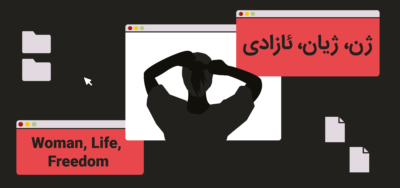March 2023 coincides with the Persian New Year, and with the New Year holidays taking up much of this month and protests slowing down, one major announcement which captured a lot of attention this month. In mid-March, several Iranian MPs made comments on a new bill being worked on to implement technologically-assisted hijab enforcement. MP Bijan Nobaveh kicked off the news by commenting that the plan includes the use of “smart” measures to enforce mandatory hijab, and new penalties and punishments for non-compliance, including restrictions on internet and phone services, as well as other social exclusion measures.
The issue of women’s rights and their treatment as second class citizens, as exemplified through enforcement of mandatory hijab and so-called Islamic dress code, lay at the heart of the September 2022 protests. Since then, the women of Iran have been bravely protesting these restrictions by removing their hijab in public spaces, risking their freedom and safety.
In what appears to be a strategic move to take advantage of the lull in protests this time of year, officials are once again prioritizing the issue of hijab enforcement, and have made several recent announcements as means to appear in-control of the issue and rolling back any of limitations of enforcement in recent months. With comments from Nobaveh and other MPs, it appears that Iranian officials are keen for technology to play a central role in identifying women, whether through facial recognition or CCTV cameras. The enforcement will be more “contactless” in nature according to the comments, perhaps an attempt to manage the reputation of the so-called Morality Policy and mitigate any potential public outrage or concern about a repeat of the events that surrounded Amini’s death. At this time, the extent to which advanced technologies, such as facial recognition, are being used inside Iran, and how much of this technology is domestically produced or imported remains largely unknown.
Filterwatch has already written about the use of technology in Iran and its implications for the suppression of women’s rights and dissent. New penalties, such as internet restrictions on those not complying with hijab laws, is a significant development and once again hints at the government’s plans for segregating internet access in Iran otherwise known as layered or tiered filtering which has been in the works for years.

Iranian MPs Speak on “Smart” Measures for Hijab Enforcement and New Penalties Including Internet Restrictions
On 15 March, Iranian MP Bijan Nobaveh spoke of plans in the Majles (parliament) to introduce “smart” and “indirect” means to enforce mandatory hijab using street cameras. He added that if warnings were ignored, women could be “cut off from accessing phone and internet services.” While there have been inconsistent reports on the status of the plan, in a recent interview another MP, Hossein Jalali spoke of a “chastity and hijab” bill “being finalized” in Majles which confirms Nobaveh’s comments. Jalali added that under the bill “there will be no physical enforcement [of hijab law]”. Authorities will punish violators with fines and revocation of passports and driver’s licenses thereby affirming the use of further social exclusion measures in addition to fines to further restrict the rights of women.
Proposal for Audio-Visual Regulatory Authority’s Powers in the Draft Budget Scrapped According to MP
In a tweet on 19 March MP Mojtaba Tavangar claimed that the Majles and the Guardian Council had removed the “monopoly powers” given to the Audio-Visual Regulatory Authority (SATRA) which enabled it to exert “excessive pressure” over video-on-demand services in the new annual Budget. The draft Budget still contained a clause giving SATRA – operating under the Islamic Republic of Iran Broadcasting (IRIB), which also has its own video-on-demand service – the power to issue licenses for online audio-visual production. For a number of years video-on-demand services have been questioning the legal authority of SATRA in this area, especially in light of the body’s conflict of interest in having its own platform among other issues, which the Budget sought to clarify. SATRA had previously referred major video-on-demand platforms such as Filimio to the judiciary to be blocked which did not result in any action against the platforms. In light of these developments, SATRA’s position, and the oversight of online audio and visual content still remains unclear.
Iran’s National Centre for Cyberspace: “Complaint Against International Platforms is Ready”
On 14 March the National Centre for Cyberspace (NCC) announced that a “complaint against international platforms including evidence is ready.” According to the NCC, the complaint is “to prove the double standards by international platforms [against Iran] in an international forum.”
It is unclear which platforms are the targets of the so-called complaint and how and where they are being submitted. However, the crux of the issue remains Iran’s demands for international social media platforms to comply with the country’s laws. The NCC previously attempted to speak to Meta about Instagram and WhatsApp content moderation policies and compliance with local laws in October 2022, which was rejected by Meta.
These attempts came after the start of widespread nationwide protests when Instagram and WhatsApp, the last few remaining international social media and messaging apps, were blocked. Despite various calls by businesses and those inside Iran who rely on the platforms for e-commerce and business to unblock these platforms, Iran’s position has not changed. Instead Iran seems to be focused on forcing compliance with its domestic laws, which do not respect individual freedoms and human rights.
New Regulation Banning Executive Bodies from Purchasing Foreign IT Products or Services Passed
On 13 March a new regulation called “Supporting Knowledge Production and Job Creation in the Field of ICT and Digital Economy “ banning executive bodies from purchasing foreign IT related products and services was issued. The new regulation is reportedly aiming to support Iran’s domestic tech and IT sector.
New Bill on “Combating False News Online” Proposed to Government
On 17 March the Deputy for Culture, Social, and Content at the National Centre for Cyberspace (NCC), Ghasem Khaledi announced that a new bill, with backing from the judiciary in “combating false news” had been proposed to the government. While there are limited details currently available about the content of this bill, according to Khaledi, the aim is to compel the private sector to respond more swiftly, adding that “during events such as the recent school poisonings if we could only deal with the false news of these issues – regardless of what happened in the field – we would face fewer problems”.
The issue of combating “false” or “fake” news was first raised by the the Supreme Council of Cyberspace (SCC) in January 2021, in a resolution titled the “Document on Preventing and Combating the Dissemination of Misinformation and Fake News and Content in Cyberspace” where the groundwork for a new piece of legislation on the issue was laid. This new development raises major concerns about threats to freedom of expression and digital rights online given Iran’s history of censorship, crackdown on dissent and government criticisms online, and restricting press freedoms. This latest bill seems to further codify these actions into law in the name of combating “false news” and to compel the private sector – including to comply with these laws, which may include calling for international companies to also comply.

Iran’s ICT Ministry Claims First Test to Exchange Messages Between Different Domestic Messaging Apps Has Been “Successful”
On 27 March the ICT Ministry announced that an “initial test” to facilitate the exchange of messages between two domestic messaging apps, Baleh and Eita, “has been successful” adding that other capabilities such as “exchanging files was to be added in the next phase.” The ICT Ministry plans to extend this functionality to other domestic messaging apps over time.
Encouraging and enforcing the use of domestic messaging apps provided via the National Information Network (NIN) over international apps has been a long term policy in Iran. Various incentives such as lower costs, and additional services such as online banking being offered via these apps have been used to entice users onto these platforms. Reports from inside the country suggest major growth in users for domestic apps. This is not surprising in light of the limited choices available to those in Iran due to the censorship of international messaging apps such as Telegram and WhatsApp, and the fact that these platforms offer cheaper internet traffic and offer additional services as means to force users onto these apps.
The interoperability between domestic messaging apps is yet another way to promote the use of these apps. However, these apps have weak security and privacy features compared to their counterparts, leaving users more vulnerable to threats, especially potential government surveillance. The interoperability between domestic apps raises further questions about the privacy and security functions for this feature, for which no details have been provided.
National Centre for Cyberspace Releases Statistic on Active User Numbers for Domestic Messaging Apps
On 14 March, the Deputy for Culture, Social, and Content at the NCC, Ghasem Khaledi reported the latest figures on domestic messaging apps. According to Khaledi “Eita has over 13 million, Soroush Plus has over 5.5 million, Baleh 4,700 million, and Rubika over 20 million daily active users.” On 23 March, Baleh also claimed a 400% increase in the number of users in the days prior to the Iranian New Year. Baleh offered its users free internet around the holidays this March. While Filterwatch is unable to verify these figures and the rate of growth for these messaging apps, it appears that the current climate of internet shutdowns, challenging economic conditions, and internet restrictions has forced users to rely more and more on insecure domestic messaging apps.
Iran’s Tejarat Bank Purchases Shares in Digital Payment System Digipay
On 5 March Iranian tech news website Peivast reported that the Iranian commercial bank, Tejarat Bank has purchased a 20% share in the online payment service, Digipay. The Iranian government has a minority share in Tejarat Bank.
Irancell Reports the Production of 5 Thousand Domestic Mobile Phones
According to telecommunication company MTN-Irancell’s annual report published this March, the company has produced 5 thousand domestic mobile phones in collaboration with state owned Iran Electronics Industries and 9 million SIM cards with domestic operating systems.

News Website “Rouydad 2” Seized and Blocked by Iranian Authorities
On 23 March the Iranian news website “Rouydad 24” was seized and blocked by an “unknown authority” according to Farhad Farzad, the website’s Editor in Chief. According to the news website no prior warnings were issued to the website and no reason was provided for blocking the website. In a tweet on 26 March Farzad confirmed that the website was unblocked by the same “unknown authority” with the promise to “not publish critical content” as a prerequisite for the website being unblocked.

Reason Behind Iran’s Brief Nationwide Near-Total Internet Shutdown Remains Unclear
On 15 March at around 10am local time, Iran experienced a near-total nationwide internet shutdown which lasted around 15 minutes. Iran’s ICT Minister, Eisa Zarepour denied a cyberattack being the cause of the shutdown, adding that the issue was “with an operator’s infrastructure”. Filterwatch cannot verify Zarepour’s comments, but in recent months there have been other brief nationwide internet shutdowns in Iran which authorities have attributed to vague and unverifiable reasons. Our monthly Network Monitor provides more details on internet disruptions.
Iran’s ICT Minister: “We Did Not Have Any Pre-Planned Internet Shutdowns that Required Prior Notification”
In an interview on 27 March Iran’s ICT Minister Eisa Zarepour claimed that there were “no pre-planned internet shutdowns that required prior notification” during the previous Iranian calendar year (March 2022 – March 2023). Zarepour’s claim comes as Iran had a record-breaking number of internet shutdowns, especially in response to protests since September 2022. Find out more in our Network Monitor.




